Joseph Herrin (05-28-2014)
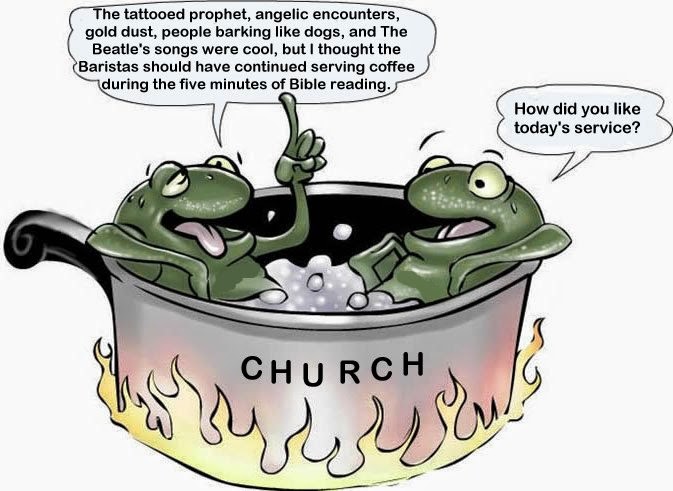
What passes for spiritual life in many Christian churches today bears no resemblance to the life of the early church that is set forth in the New Testament. Truly, those who call themselves followers of Christ have fallen from the example of sober minded saints who were intent on bearing the cross and making disciples of Yahshua, and they have become silly, ridiculous, and vain as they have embraced every new claim of God doing something supernatural in their midst. How has the church become a house of quackery where the most ludicrous deceivers are given a platform to speak nonsense to the body of Christ? Why are these men and women and their messages not tested to see whether they are of Christ? I believe a large part of the blame lies with the efforts of Satan, who has for decades worked to condemn and ostracize those who would exercise discernment and judgment among the body of Christ. This has driven the practice of exercising judgment out of the church, leaving her susceptible to the most egregious examples of spiritual charlatanism.
Before the Father called me out of the established church system, He appointed me for a season to serve as both an elder and a minister in a number of churches that had plural leadership structures. I have always recognized my call to be that of a teacher. In the fulfillment of this calling I have had many occasions to do the very things that Paul instructed Timothy to do.
II Timothy 4:2
Preach the word; be ready in season and out of season; reprove, rebuke, exhort, with great patience and instruction.
Being called to fulfill the role of a minister to God’s people in this hour, when spirituality and true commitment to Christ are at ebbtide, I found myself needing to offer correction to brothers and sisters in Christ on numerous occasions. I was unprepared for the reaction that I received. I wrote about this experience in an early article posted to the Heart4God website titled The Issue of Judging. I will cite a portion of that writing here.
—
The Bible contains both clear admonitions to judge, as well as warnings against judging. On the surface these admonitions seem to be in contradiction to one another. However, we know that God is not the author of confusion, so there has to be a proper way to view all of these scriptures in harmony with one another.
This has long been a troubling issue for me because, as a minister with a prophetic gifting, God often has spoken words of correction, instruction and warning through me. On many occasions these words have not only been rejected, but they have elicited a very vitriolic response from brothers or sisters. Often my character and motives have been attacked because a member of the body did not want to hear truth, or allow the Spirit of God to delve into areas of their life that they had walled off from His inspection.
Because I grew up under the influence of the strong men of guilt, condemnation, and shame I have been quick to believe that I must have been in error when the words God had me share with others were rejected. I would look for the tiniest indication that the message of God was influenced and corrupted as it passed through the vessel of my flesh. Did I err by not speaking in love? Did I not have the person’s welfare in mind when I spoke to them? Did I let my own feelings of rejection add a harshness to the delivery of the word because I anticipated that I would be rejected and criticized?
I am certain that at times there was some substance to these questions that arose in my mind. However, I am fully convinced that the rejection of correction and warning is most often due to the fact that in the Western world the mass of Christian believers simply do not receive these things well. There is little true discipleship in churches. Members are courted and catered to. Offending a brother is looked upon as the most grievous of offenses. There are too many competing churches to risk offending a brother or sister. It is too easy for them to pack up and go somewhere else where no one will interfere with the way they choose to live their life.
In many ways, the mass of church goers are like spoiled children. They are given everything they want with little required of them in return. Even as a spoiled child pitches a fit or throws a temper tantrum when told they cannot do something, or when they are corrected, so do many of the saints of God. It is largely because such an atmosphere of tolerance and appeasement has been adopted in the church that the issue of judging has fallen out of vogue and is looked down upon as unkind and uncharitable.
[End Excerpt]

Men and women who are petulant in their fleshly form of Christianity will often respond to the person offering correction by telling them that the Bible commands believers not to judge others. The statement “Judge not lest you be judged” is bandied about as if it is the end of the matter. Christians are told that they are simply not to judge. If they attempt to do so they are labeled as being critical, divisive, or holier-than-thou. The large body of Scripture passages that command Christians to judge, to exercise discernment and correction, is neglected. Following is a further excerpt from the writing The Issue of Judging.
—
Admonishments to judge:
In my ‘puzzling’ out this issue of judging I began by looking at scriptures that give instructions to judge. I did this because I wanted to understand the scriptures that say not to judge and I knew they could not violate these admonitions to judge. This is therefore a good starting point. The first scripture comes from our Lord and is found in the book of John.
John 7:24
“Do not judge according to appearance, but judge with righteous judgment.”
The words rendered as ‘judge’ in this verse are the Greek word ‘krino’ which according to Strongs’ Dictionary is interpreted “to distinguish or decide, and by implication, to try, condemn, or punish.”
The context of this verse is not specifically a command to make judgments. Rather, it is a rebuke to those who make judgments according to appearance, condemning that which God has not condemned. The Jewish leaders were condemning Jesus because He healed on the Sabbath. These are told to not judge by appearance but to judge righteously. This principle of not judging by appearance is reflected in the following prophetic passage of scripture that foretells the coming of Christ.
Isaiah 11:3-4
And shall make him of quick understanding in the fear of the LORD: and he shall not judge [8199] after the sight of his eyes, neither reprove [3198] after the hearing of his ears: But with righteousness shall he judge [8199] the poor, and reprove [3198] with equity for the meek of the earth: and he shall smite the earth with the rod of his mouth, and with the breath of his lips shall he slay the wicked.
(KJV)
In this passage the word ‘judge’ is Strongs’ number 8199, shaphat (shaw-fat’); meaning to judge or pronounce sentence for or against. By implication, it means to vindicate or punish, and extended out it carries the meaning ‘to govern.’
Likewise, the word ‘reprove’ is Strongs’ number 3198, yakach (yaw-kahh’); meaning to be right or correct. In application, it means to argue, to decide, justify or convict, appoint, argue, chasten, convince, correct, dispute, judge, maintain, plead, reason (together), rebuke, and reprove.
This scripture is a prophecy of Christ, but as God’s stated purpose for us is to be conformed to the image of His Son, we can by implication draw application to ourselves from this passage. Judging, pronouncing sentence, determining a person’s right standing or wrong standing, or governing is not to be done by what our eyes see, according to appearance. Additionally, reproving, determining what is right or correct, putting forth an argument, making decisions, justifying, or convicting is not to be based upon what we have heard with our ears. In other words, right and wrong is not to be decided through what our physical senses report as it is weighed by our mind.
It is with righteousness that judging and reproving are to be done. What is the source of this righteousness if it does not arise from our reasoning as we evaluate that which is seen and heard?
Psalms 7:11
God is a righteous judge…
Psalms 11:7
For the LORD is righteous; He loves righteousness; the upright will behold His face.
God alone is the source of righteous judgment. As we behold Him we learn of His righteous judgments and we cast off our own judgments formed from what we see and hear. If we are to walk in righteousness, all of our judgments must originate with God lest we find ourselves condemning what God has not condemned and approving what God has not approved. The only acceptable judgment is that which finds its source in God. This is further revealed in the following verse.
John 5:30
“I can do nothing on My own initiative. As I hear, I judge; and My judgment is just, because I do not seek My own will, but the will of Him who sent Me.”
Jesus is not referring here to hearing with His physical ears, He is speaking of hearing from God. Jesus’ judgment is in harmony with the Father’s judgment. They are one and the same. Jesus merely speaks that which He hears the Father saying. This is to be our pattern as well.
A further admonishment to judge is found in Paul’s instructions to Timothy.
II Timothy 4:1-2
I solemnly charge you in the presence of God and of Christ Jesus, who is to judge [krino] the living and the dead, and by His appearing and His kingdom: preach the word; be ready in season and out of season; reprove [1651], rebuke [2008], exhort, with great patience and instruction.
Timothy, an elder in the body of Christ, is told to refute those in error. ‘Refute’ is Strong’s number 1651, elegcho (el-eng’-kho); meaning “to confute, or admonish.” The word ‘confute’ is defined as: to prove to be false or invalid; convict of error. Timothy is also told to rebuke. The word ‘rebuke’ is Strongs’ word 2008, epitimao (ep-ee-tee-mah’-o); meaning “to tax upon, i.e. censure or admonish; by implication, forbid.”
In this passage we see that Paul is telling Timothy that as an elder and leader in the body of Christ he is to admonish, he is to prove that which is error to be false or invalid, he is to convict of error, he is to censure those who hold to error, and he is to forbid continuing in error.
All of these things required that Timothy had to discern the mind of the Father to know what was false and what was true. As he did so he was to apply himself diligently to keeping the body free from error and clinging to that which was right. In similar manner, Paul exhorted Titus, another elder:
Titus 2:15
These things speak and exhort and reprove with all authority. Let no one disregard you.
Paul further elaborated to Titus:
Titus 1:12-13
One of themselves, a prophet of their own, said, “Cretans are always liars, evil beasts, lazy gluttons.” This testimony is true. For this cause reprove them severely that they may be sound in the faith…
The word ‘reprove’ here is the same word spoken to Timothy. The word ‘severely’ comes from a Greek word meaning “to cut abruptly or peremptorily.” ‘Peremptorily’ is defined as: final, decisive, precluding discussion or hesitation. It should be noted that reproof and rebuke was not always to be given with such sharpness. This instruction was given to Titus due to the nature of the people he was ministering to. However, Paul gave Timothy this qualification on how to address those in the body he ministered to.
I Timothy 5:1-2
Do not sharply rebuke an older man, but rather appeal to him as a father, to the younger men as brothers, the older women as mothers, and the younger women as sisters, in all purity.
Through the clear message of these passages we can clearly determine that the admonition to “not judge” found in some scriptures does not preclude an elder or minister from his clear responsibility of correcting, refuting, reproving, rebuking, censuring, etc..
Some further scriptures indicating that there is a proper place for judgment are found in Paul’s instructions to the Corinthian church. These hold a somewhat different application in that these letters were not sent just to those who were elders, but to the body in general.
I Corinthians 5:9-13
I wrote you in my letter not to associate with immoral people; I did not at all mean with the immoral people of this world, or with the covetous and swindlers, or with idolaters; for then you would have to go out of the world. But actually, I wrote to you not to associate with any so-called brother if he should be an immoral person, or covetous, or an idolater, or a reviler, or a drunkard, or a swindler– not even to eat with such a one. For what have I to do with judging outsiders? Do you not judge those who are within the church? But those who are outside, God judges. Remove the wicked man from among yourselves.
This passage indicates that the church is to discern who among the body are immoral, covetous, idolaters, revilers, drunkards, or swindlers. This discernment was to be followed with action. If the person would not repent they were to be shunned and the believer was not to even share a meal with such a one. In the same passage Paul corrected any misconception that this judging was to apply to those outside of the church. It is not the responsibility of the church to judge those outside of the church. Paul states that God will judge these.
In verse 12 Paul asks a rhetorical question, “Do you not judge those who are within the church?” Again, the word ‘judge’ here is the Greek word Krino which is interpreted “to distinguish or decide, and by implication, to try, condemn, or punish.”
That which precipitated this message to the Corinthian believers was the presence of sin in the body that was being tolerated, rather than exposed, confronted and removed. Paul speaks of those who were coming to partake of the Lord’s supper who were getting drunk and behaving gluttonously. Additionally, he addresses the issue of a man who was partaking of all of the rights of fellowship among the body when he was in gross immorality having taken his father’s wife for himself.
Paul clearly states that such sins are not to be ignored or glanced over. The members of the body are to discern those who are walking in disobedience and to reprove them for their error. If they will not repent they are to be ostracized, excluded from the privileges of fellowship.
By this we can deduce that any scripture speaking against judging does not forbid the actions that Paul states here are the clear responsibility of the body of Christ; to discern that which is blatant sin and to reprove those who are in sin, refusing to associate with them if they will not repent. Paul gives further instructions to the Corinthian believers regarding judging.
I Corinthians 6:2-3, 5
Or do you not know that the saints will judge the world? And if the world is judged by you, are you not competent to constitute the smallest law courts? Do you not know that we shall judge angels? How much more, matters of this life? I say this to your shame. Is it so, that there is not among you one wise man who will be able to decide [diakrino] between his brethren…
The word ‘decide’ found in verse 5 is Strongs’ number 1252, diakrino (dee-ak-ree’-no); meaning “to separate thoroughly, that is to withdraw from, or by implication to oppose.” It also means to discriminate.
Again, this passage is prompted by the disobedience of the members of the body who were suing one another in civil courts. This body was very divisive, having different factions who claimed loyalty to different men. Some claimed they were of Paul, some of Apollos, some of Cephas, and some of Jesus Christ. This divisiveness extended even into the arena of legal disputes and many were taking one another to court to their own shame.
Paul rebukes them for this and chides them for not being able to resolve their issues among themselves. He tells them they will judge the world and even angels. How much more should they be able to make simple judgments among themselves. In verse 5 Paul is asking them, “Can no wise man be found among you who can divide a matter and resolve it to its root issue, discriminating between right and wrong?” This was something the church should certainly handle themselves.
In this we can further deduce that any word against judging cannot be interpreted as infringing upon this obvious responsibility of the body to settle disputes among itself, even disputes that would be considered of a civil nature. The body is to police itself. They are to discern right and wrong from God’s righteous perspective and conduct their daily lives according to the dictates of what they have discerned.
[End Excerpt]
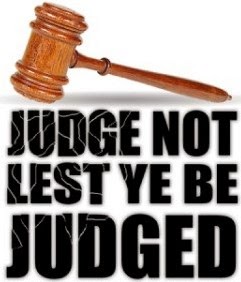
These Scriptures, and a great many more, shatter the myth that Christians are not to judge. It is really an untenable position to suggest that Christians should not judge. The individuals condemning so strenuously those who practice discernment and judgment in the body of Christ are violating the very principle they are promoting, even as they speak. To be critical of Christians who judge is an example of judging. (For those who have questions about the Scripture passages that speak against judging, and how they are to be harmonized with the many admonitions to judge, I recommend reading the full article cited above.)
The tragic fruit of the false doctrine of “Judge Not” is that the people of God have become passive when it comes to exercising discernment, and tolerant of many things that should not be tolerated. The church has become a menagerie, or circus, filled with ridiculous men and women who are declaring unsound things and engaging in unprofitable behaviors. I recently came across one egregious example of this as I read of Bill Johnson, pastor of Bethel Church and leader of Bethel School of Supernatural Ministry (BSSM). Bethel Church is a Charismatic, Pentecostal church associated with the Assemblies of God denomination, and has weekly membership of about 3,500 people. Bill Johnson’s influence is much wider, however, as he is a popular speaker among the prophetic movement crowd.
Bill Johnson has supported the John G. Lake Healing Rooms. This is another one of those modern day movements that has been built upon the foundation of a past historical person who is being described as a champion of Christianity when the individual was in fact a charlatan and a deceiver. These John G. Lake Healing Rooms are spreading across America, with naive and gullible Christians flocking to them to receive healing (and fleecing). In one account of Bill Johnson’s involvement with these healing rooms, I read the following.
BILL JOHNSON AND THE JOHN G. LAKE ANGELIC HEALING ROOMS
How the Healing Rooms were founded. These healing rooms having “healing angels;” the Bible says:
Col. 2:18, “Let no man beguile you of your reward in a voluntary humility and worshipping of angels, intruding into those things which he hath not seen, vainly puffed up by his fleshly mind,” KJV
I personally know a woman who reported to us that she had gone to Spokane, Washington with Bill Johnson and a group of Christians to investigate John G. Lake’s healing ministry… They wanted to see John G. Lake’s home. Some of Lake’s relatives had bought his home and were restoring it. They refused to let these weird Christians inside. However, they were pulling up old lanoline (sic) and other things and throwing this stuff out for the trash. The Christians, like vultures, grabbed the Lake trash out of the garbage. She brought this rubbish to her home and made a collage cross and hung it over her bed.
After leaving Lake’s old home, Bill Johnson and his group went to the cemetery to visit his grave. This woman told us they all “rolled on the grave” to get Lake’s anointing. Then they went to the old building where he conducted his healings. To their amazement, the building was up for lease. She said, “A woman needed healing and they were in a back room. Suddenly, peace came into the room… A tall angel was in the room and healed her friend. They got Bill Johnson and when he came into the room, he claimed on Sid Roth program that the angel spoke to him and said, “Where have you been….. I’ve been waiting for you to come for 80 years.”
Sid Roth asked him, “Could you see the angel?” Bill Johnson admitted that he could not see the angel that he sensed his presence…. He then said, “He was about 10 or 11 feet tall.”
Johnson leased the John G. Lake building and thus we now having “Healing Rooms,’ around the nation. The woman friend of mine told us that many then went to Kathryn Khulman’s (sic) grave and rolled on her grave to receive her anointing…. Then they went to Aimee Semple McPherson’s grave and Corrie Ten Boom.
[Source: http://www.remnantradio.org/Archives/articles/PH/Newsletters/REV.%20BILL%20JOHNSON%20-%20HEALING%20ROOMS%20-%20GOLD%20DUST%20AND%20GEM%20REVIVALS%2005-01-10.pdf]
It is bad enough to fail to exercise spiritual discernment by embracing spiritual deceivers from the past. This error is exacerbated when individuals such as Bill Johnson encourage their followers to venerate these men and women, and to engage in bizarre and un-Biblical behaviors such as rolling on the graves of deceased individuals to receive their anointing. The prophetic movement has made much ado about spiritual impartations. Death presents no barrier for them in this practice. If you want the anointing of a deceased Christian, just visit their grave, or some other place they frequented, and you can receive an impartation of anointing. Such ideas are folly at best, and demonic at worst.
The following video shows John Crowder, another individual promoting this false type of spiritual impartation, at the gravesite of John Alexander Dowie. Bill Johnson has endorsed Crowder, who is here heard saying,
We’ve just come to the grave today to release to you an impartation of healing revival, of city building, restoration city-taking anointing, master-building apostolic anointing, and so we just rip it right out of the ground, we just suck it right off his dead bones, in Jesus name, and loose it to you., a healing-revival-glory-master-building-apostolic anointing glory…
There is a great irreverence among some of these individuals as well. About halfway through the video above John Crowder says, “Just take a hit off of controversial glory. Take a hit off of pioneering, forerunning glory.” The phrase “take a hit” is street slang that one might use when speaking of illegal drug use. It is common for people smoking marijuana to share the same cigarette, or joint. They would say “take a hit and pass it along.” To refer to the glory of God as something that an individual can take a hit off of is to greatly debase the holiness and reverence of Yahweh.
John Crowder speaks glowingly of Alexander Dowie, discounting the many newspaper accounts of his misdeeds as merely the attacks of an anti-Christian press. I do not know whether John Crowder has ever looked into the accusations against Dowie. There is much evidence to condemn the man as a deceiver who greatly misled great numbers of people and was the cause of great suffering for many. Dowie was extreme in his healing views, holding a belief similar to David Eells of Unleavened Bread Ministries, and resulting in similar tragic results (see the story of Kara Neumann).
Dowie taught that healing is promised in the atonement and insisted that those who sought faith healing give up all medical care. He viewed druggists and physicians as instruments of the devil. When his own daughter was severely burned after accidentally knocking over an alcohol lamp, he banished one of his followers for trying to alleviate her pain with Vaseline. He refused to allow her any medical treatment and she died in that condition. Many others who came to his faith cure homes died of their illnesses without any medical attention.
[Source: http://www.deceptioninthechurch.com/strange1.htm]
(For a Biblical understanding of faith and healing, I recommend the writing titled Understanding Faith and Healing.)
In his later years Dowie claimed to have had a revelation that he was The Elijah of the last days, and the first apostle of the Restoration. In his presumptuous role as Elijah, Dowie began to dress in garb modeled after Aaron’s High Priestly garments.
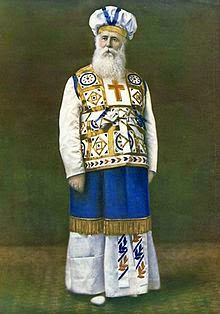
John Alexander Dowie
Dowie purchased land in Illinois and established the town of Zion. The entire town of about 7,000 individuals was comprised of his followers. Dowie owned all the property, and he controlled the local business that church members worked in. He was accused of misappropriating funds, a charge that has a factual basis to it as Dowie built for himself a 25 room mansion while most of the church members lived off of sub-standard wages for the time.
Although Dowie’s doctrine declared that physical health was promised to all mankind through the atonement of Christ, he suffered a debilitating stroke in 1905. He never fully regained his health after that, and suffered numerous subsequent strokes. He died after having been depressed and bed-ridden in 1907.
Dowie had chosen as his lieutenant a man as avaricious and deceived as himself. When Dowie suffered a stroke in 1905 while traveling in Mexico, W.G. Voliva, his second in command, took advantage of the situation and wrested control of Zion. Upon his return to Zion, Dowie sought to regain control, but was unsuccessful, being forced to be content with an allowance provided by the church. Voliva, continued to stress the promise of divine health as a consequence of Christ’s atonement, yet he also died after being stricken with cancer. In the year 1942, at the age of 72, Dowie’s successor confessed that he too had misappropriated church funds for his own personal use, and had committed “other serious sins.” There were numerous charges of sexual misconduct relating to Dowie and to Voliva, and it seems likely that it was to this that Voliva was referring. Voliva had previously proclaimed that he would live to be 120 years old, based upon the promise of God in Genesis 6:3. Nevertheless, he fell 48 years short of that goal.
Aside from Dowie suffering the horrific tragedy of his 21 year old daughter Esther being horribly burned by an overturned lamp that was fueled by alcohol, and subsequently dying, Dowie lost his young daughter Jeanie to sickness 17 years earlier when he was in the midst of his healing ministry and claiming remarkable success with others.
Understanding the true history of Zion, Illinois, and the ambitious, self-aggrandizing men who founded and ran the town, it seems implausible that John Crowder, or any other person, will be resurrecting and loosing any glory, or healing anointing, from that location. They can sing and dance atop Dowie’s grave, but heaven will not be moved to send forth an anointing.
Many naive and spiritually immature Christians are buying into this hokum. Members of Bill Johnson’s Bethel School of Supernatural Ministry have been visiting the graves of dead people and rolling on the graves, or “cuddling” with the spirits of the deceased.
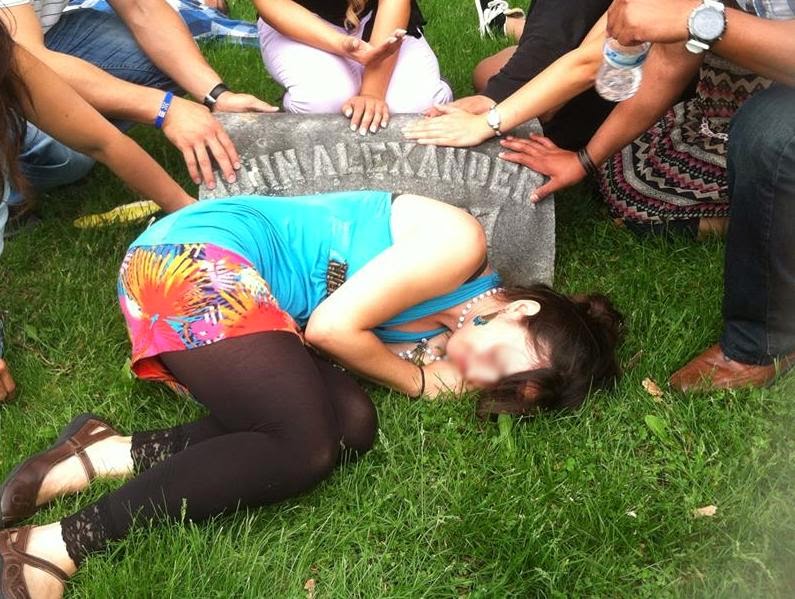
Students of BSSM at the Grave of Alexander Dowie
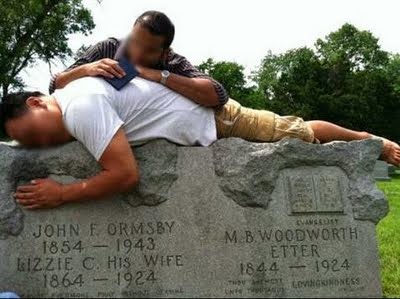
BSSM Students at Maria Woodworth-Etter’s Grave
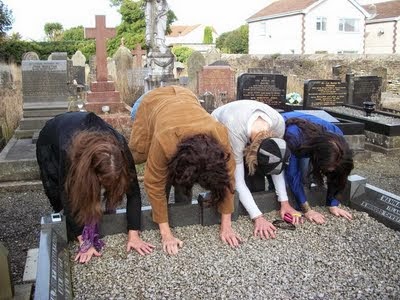
2nd Year BSSM Students Sucking Up Anointing from Evan Roberts Grave
(Evan Roberts was instrumental in the Welsh Revival)
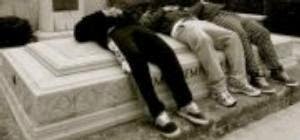
BSSM Students “catching some anointing” from Aimee Semple McPherson’s Grave
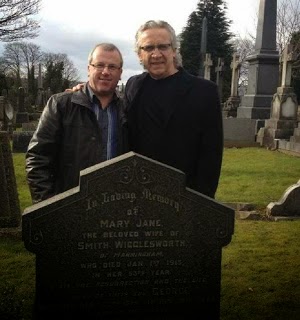
Bill Johnson (on right) at Smith Wigglesworth’s Grave
[Source of Images: https://heart4god.ws/wordpress/2011/07/bill-johnson-and-john-crowders-leaven.html]
Brothers and sisters, one has to exercise only a little discernment to discover that there is something wrong with the behavior that these Christians are engaging in. Only believers who have abandoned the practice of testing all things would be so gullible as to embrace such ridiculous notions. Neither Yahshua, nor His apostles, ever promoted the idea that a person could gain a spiritual anointing by visiting the grave of a dead person. This practice is very similar to the apostate Roman Catholic practice of venerating saints and building shrines at the locations they lived, or were buried. The apostles have declared to us that spiritual gifts and ministerial appointments, are administered by the Holy Spirit according to the determination of Yahweh.
I Corinthians 12:4-11
Now there are varieties of gifts, but the same Spirit. And there are varieties of ministries, and the same Lord. And there are varieties of effects, but the same God who works all things in all persons. But to each one is given the manifestation of the Spirit for the common good. For to one is given the word of wisdom through the Spirit, and to another the word of knowledge according to the same Spirit; to another faith by the same Spirit, and to another gifts of healing by the one Spirit, and to another the effecting of miracles, and to another prophecy, and to another the distinguishing of spirits, to another various kinds of tongues, and to another the interpretation of tongues. But one and the same Spirit works all these things, distributing to each one individually just as He wills.
It is not up to Christians to choose their anointing for service. Paul declares in another place that Yahweh has prepared those specific works for each individual believer beforehand.
Ephesians 2:10
For we are His workmanship, created in Christ Yahshua for good works, which God prepared beforehand, that we should walk in them.
It is not left to mankind to choose what anointing they will receive from God. We may “earnestly desire greater gifts” (I Corinthians 12:31) that we may employ them for the edification and benefit of the body of Christ, but it is up to Yahweh to decide whether we receive specific giftings. These things are not to be obtained by soaking up an anointing from the grave of a deceased person.
An absence of discernment is observable among those who are embracing such foolishness. It would take only a little investigation to discover that individuals such as John G. Lake, Alexander Dowie, Kathryn Kuhlman, and Aimee Semple McPherson were deeply flawed individuals who routinely practiced deception and lived immoral lifestyles. The following information on John G. Lake taken from one Internet website can be found corroborated at many other sources.
According to the 7/24/21 issue of the Oregonian and subsequent issues. John Lake was arrested, charged, and forced to settle out of court for a blue sky scam in which he promised members of his congregation stock in a mining company if they paid their tithes in a lump sum. The stock was never delivered.
Nov. 21, 1933 Lake advertised the appearance of an Arab healer, Abdul Ben Shinandar in the Oregonian. On Nov. 25 the same paper uncovered that the Arab healer was actually Lake dressed in costume.
August 25, 1921 Lake was arrested and had to post $100 bond for impersonating a police officer.
The May 24, 1920 issue of the Oregonian and subsequent issues chronicle the arrest of John G. Lake after the death of Hanna Anderson who died of neglect when attempts to heal her of the flu failed. Not only did Lake not heal her, but he also failed to report the illness to the CDC which was required by law at the time. He was found guilty of laxity and fined.
Inability to Heal
The Hanna Anderson story is not the only example to show that Lake’s claims of tremendous healing power were exaggerated. Consider the following headlines.“Miracles Not Seen”- The Morning Oregonian, May 24, 1920“X-Ray Belies Healing”- Oregonian 11/27/21. This particular story is of a 7 year old girl with a severely fractured thigh whose parents denied her proper medical care and took her to Lake instead. Lake pronounced her healed, however when the girl still didn’t recover she was finally taken to physicians and the fracture was discovered. Doctors indicate that she would have been crippled for life had she not received proper treatment.
“Grandma says girl made to Hear Wasn’t Deaf”- Spokane Press 7/16/24
(This article does have a story of another woman who claimed to be healed and able to walk. There is also an interesting account in the same story of a woman who was “healed” by Lake 5 times but the “pain keeps coming back.”)
“Miracles Fail, Imp of Tragedy Stalks in Tent” Spokane Press 7/23/24
The reason John Lake became so popular is that, like Benny Hinn and others today, he had a very active PR machine. Many of the positive articles that appear about him were written by him. The reality is that he is long on claims and short on documentation.
[Source: http://www.remnantradio.org/Archives/articles/PH/Newsletters/REV.%20BILL%20JOHNSON%20-%20HEALING%20ROOMS%20-%20GOLD%20DUST%20AND%20GEM%20REVIVALS%2005-01-10.pdf]
With the resources available to Christians today, it is not difficult to discover the true history of men and women who are venerated by groups of believers today. I remember back in the days when I looked at Morningstar Ministries admiringly, that a book was published by a man named Roberts Liardon titled God’s Generals. This book proclaimed that many of the individuals who are now so widely admired among the prophetic movement were considered great champions of the faith by God.
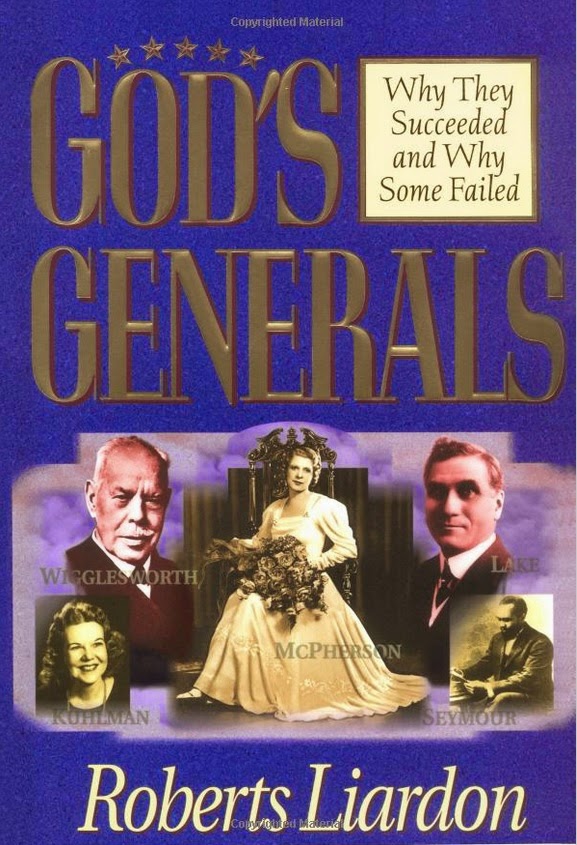
The cover of the book includes photos of John G. Lake, Aimee Semple McPherson, and Kathryn Kuhlman. The book also includes chapters on William Branham, John Alexander Dowie, Maria Woodworth-Etter, and A.A. Allen. (I am unfamiliar with some of the other individuals named.) A greater collection of apostate deceivers could hardly have been joined together. This book was a big hit among the prophetic crowd, and continues to be popular today. It has influenced the thinking of thousands who believe the individuals featured in this book are truly God’s spiritual leaders who have greatly advanced the cause of Christianity. They believe this for no other reason than that Roberts Liardon has said so.
Why are so many Christians duped? It is partly because they have fallen out of the habit of testing all things. The apostle Paul admonished Timothy with the following words.
I Timothy 5:22
Do not lay hands upon anyone too hastily and thus share responsibility for the sins of others; keep yourself free from sin.
The act of the laying on of hands is a sign of acceptance and endorsement. Paul is in essence saying that believers should not be too quick to accept any man, or his message. Each person should have their life examined to know their true character. Every message should be tested against the testimony of the Spirit and the Word. When we neglect to do these things, when we are too hasty in forming opinions about a person or message, we risk being caught up in the sins of others. The result is that we share responsibility for these sins.
Having had an Internet ministry for many years, I routinely receive links to other ministry websites, or to specific teachings, as they are forwarded to me by members of the body of Christ. Quite often I recognize that either the individual, or their message, is deeply flawed. Some people forward to me writings before they have even finished reading them. This is an inadvisable practice. Before we ever share another person’s teaching with another human being, or recommend an individual to others, we should have first performed our due diligence in examining both the message and the messenger.
I have erred in this area myself, particularly early on in my ministry. I was too quick to embrace some individuals who had some truth, only to discover later that they also had much error, sometimes very serious error. When I created the first Heart4God website I had a page that included links to other websites. After a few years I removed all the links as I became convicted by the words of Paul that are cited above. I knew some of the men and women whose websites I had links to were teaching error. Others I did not have enough familiarity with to know what all they were teaching.
I am not seeking to be uncharitable, for I have benefitted from the teachings of a great many men and women of God over the course of my life. There are many writings that I can heartily recommend. Yet, even among Christians whose lives and teachings I have found to be most praiseworthy, there can be the leaven of error. Recognizing this, I now tend to be much more specific when I mention another teacher. Rather than giving them a blanket endorsement, I will refer to a specific writing, or even a portion of one of their writings, that I found helpful. By doing so I am seeking to be more precise in my communication lest I should go too far and my words be misconstrued as an endorsement of some error the individual might be promoting.
In the same week that Rick Wiles conducted his interview with Anglican Bishop Tony Palmer, he did two shows with a man who was identified as Pastor Levy. Rick Wiles had never met this individual before, or even heard of him. Pastor Levy called up Rick Wiles’ office and said that a man whom Rick Wiles knew and respected had told him to call. Because Rick greatly respected the man who had made the recommendation, he spoke to Pastor Levy on the phone and summarily invited him to join him on an upcoming broadcast. This broadcast was extended to two shows, as Rick Wiles was very much impressed with the man’s message, speaking enthusiastically of it throughout the two hour-long interviews.
Two different brothers in Christ listened to these interviews and sent me links to them, asking me for my opinion of what Pastor Levy was sharing. His message was rather startling as he compared America to ancient Egypt, and foretold of great judgment befalling America in September of 2015. He stated that Christians should all head south to nations below the equator, or they would experience the dire judgments to befall America.
I listened to the first hour-long interview, and took some notes. I shared with the brothers who had written to me that some of the parallels between ancient Egypt and America were remarkable, but I was not hearing the Father tell me to leave America. As I shared in the recent series Double Jeopardy, Yahweh told me to return to Georgia which would be the location of my school of spiritual training, and I will not of my own initiative leave here. I will remain until Yahweh tells me I should move somewhere else.
A few days after Rick Wiles’ interviews with Pastor Levy, the broadcasts were removed from the TruNews website. Rick then shared in a subsequent broadcast that he had been deceived by Pastor Levy, and that the man was a fraud. Levy had supplied false credentials, had misrepresented the recommendation of the respected friend of Rick Wiles, and had given out some inaccurate information during the broadcasts. Added to this, it was suggested that Pastor Levy had ulterior motives for advising people to move to Central, or South America, for he was selling land to people who wanted to relocate.
Rick Wiles confessed that he had not performed any research at all into Pastor Levy. He had not even called his friend to verify whether he had in fact recommended him. He had not looked for Pastor Levy’s website, or examined his teachings, but had given him a worldwide platform to disseminate his message without knowing anything about the man. This confession is found in Rick Wile’s broadcast of May 22nd, the day after Rick aired the broadcast with Tony Palmer.
http://www.trunews.com/thursday-may-22-2014-david-jason-benham-2/
What is apparent is that Rick Wiles has not been performing due diligence in vetting those individuals, or their messages, that he is bringing onto his show. I am confident that Rick Wiles did no better in ascertaining the identity and message of Tony Palmer. If he had, he surely would have had cause to ask him some serious questions about his Roman Catholic loyalties and his apostate beliefs.
It is considered socially unacceptable today, to challenge another person regarding their life or beliefs. To do so is politically incorrect within the realm of the church, for it is viewed to be judging, and judging has been deeply denigrated. As Christians, however, we are remiss if we do not exercise discernment by testing both people and their messages. It will prove exceedingly costly as the end of this age approaches for Christians to neglect this vital responsibility. We live in an hour of apostasy and deep deception. We must be practiced in the task of examining all things closely. Let us not become partakers of the sins of others by laying hands on any man too quickly.
Heart4God Website: http://www.heart4god.ws
Parables Blog: www.parablesblog.blogspot.com
Mailing Address:
Joseph Herrin
P.O. Box 804
Montezuma, GA 31063


Hey Joseph … I'm loving this series, and thank you so much for the link!
One bit of info regarding Roberts Liardon … after God's Generals was published, he confessed to "a short-term homosexual relationship" with his church's youth pastor.
Not surprising … he has since been "restored."
Kevin Kleint